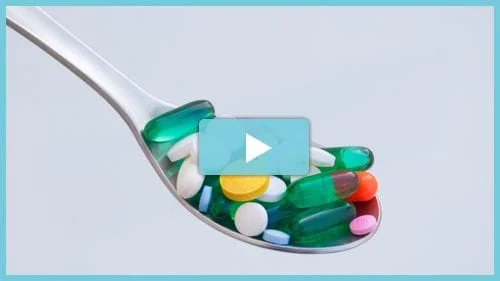1. What causes Lupus?
For a modern perspective on the causes of Lupus, click the play button for the video.
2. Can food make Lupus worse?
Have you felt that certain foods make your Lupus worse? Click the play button to learn more on how foods can trigger Lupus.
3. Can vitamins help Lupus?
Have you ever wondered if vitamins can help your Lupus? Click the play button for a better understanding of vitamins and Lupus.
Video Transcriptions
1. What Causes Lupus?
I'm Dr. Steven Baranowitz and my office is near Philadelphia in Bryn Mawr. One of the questions that every Lupus patient asks is, "What causes Lupus?" In the last fifteen years there's been very detailed and very convincing evidence of the cause.
In order to explain it, I'm going to refer to a blood test which every Lupus patient is exposed to. It's called ANA, or antinuclear antibody. This is the first test that doctors order when patients are suspected of having Lupus, and it indicates that their bodies are making antibodies, which are substances that bind to the nuclei of cells.
Now, what's in the nuclei of cells and why do these substances bind to them? In order to discuss that, I'm going to introduce a new term. The term is NuComs, or Nucleic Acid Components. It refers to DNA, which is composed, as chemists know, of nucleic acids and the things that make them up. It's been definitively established over the last few years that these antibodies to NuComs are responsible for creating many of the worst signs and symptoms of Lupus-for the arthritis, the joint problems, the rashes that occur on the skin, and the kidney disease.
In the normal American diet, we take in a large excess of NuComs. These substances may be responsible for the flares, the worsening, which is generally thought to be unpredictable, which occurs in these patients. There's good reason to believe that reducing the excess of these NuComs, which comes in the typical American diet, will also reduce the signs and symptoms of Lupus, including the rashes, the arthritis, and the kidney disease.
In order to do that, I've created a new diet which markedly reduces the amount of these substances, but is balanced in every other respect that patients need. This diet is called DART, for Dietary Auto-Immunity Reduction Therapy, and I'll be discussing it in more detail in the next video.
2. Can food make Lupus worse?
I'm Dr. Steven Baranowitz and my office is right near Philadelphia in Bryn Mawr. One of the common questions that Lupus patients ask is whether there is a relationship between food and Lupus.
Many patients know that specific foods seem to make them worse. But if they ask their doctor about it, they're usually told that there is no specific diet for Lupus. And if they go online and look at different websites, they're usually told that, well, a generally balanced nutrition meal is all that can be recommended. In fact over the last fifteen years, there's been very detailed and very convincing research which has documented how certain components of the food tend to cause flares of Lupus.
In order to explain this, I'm going to introduce a new term. The term is NuComs, or Nucleic Acid Components. Most of us know that the DNA, the genetic material, resides in the nucleus and is composed of what chemist call nucleic acids. There is no doubt that the body of Lupus patients manufacture antibodies, substances that bind to these nucleic acids, and that these antibodies are responsible for much of the damage which is done in Lupus patients-damage to their joints, that is arthritis, damage to their skin in the form of rashes, and damage to the kidneys in the form of kidney disease.
In order to address this, I've created a large database of information on the NuCom component of the most common foods that Americans eat. And I've created a new diet which minimizes these excess components which stimulate Lupus patients to flare. This new diet is called DART, Dietary Auto-Immunity Reduction Therapy.
In my office each patient gets an individual diet which is customized to the stage of their disease and their medical condition. I have no doubt that practically every Lupus patient, regardless of the stage of their disease, can benefit by this sort of diet which minimize those substance which tend to make their Lupus worse.
In the next video I'm going to discuss a related question: How can vitamins benefit Lupus patients?
3. Can vitamins help Lupus?
I'm Dr. Steven Baranowitz and my office is right near Philadelphia in Bryn Mawr. One of the common questions that Lupus patients ask is whether vitamins can help them.
Often the answer they get is that there is no specific information on vitamins and that a general nutritionally balanced diet is their best bet. In fact, there's been very detailed and excellent research over the last ten years which has identified certain vitamins that do benefit Lupus patients.
The class of vitamins which has been most extensively researched is called retinoids. It comprises a variety of vitamins that most people are aware of, such as beta-carotene and vitamin A. And also there are substances derived from these vitamins which have been developed as prescriptions drugs for a variety of diseases. The most common derivative is called Retinoic Acid and it's been used for certain types of cancer and for skin diseases. Generally, there's no doubt that large doses of some of these vitamins or their related derivatives are helpful to Lupus patients and in fact can help reduce some of the complications of their kidney disease. However these doses and the frequency with which they're used are far above those which people typically take in a multivitamin supplement.
So, the use of vitamins and related substances in Lupus patients is not something the patients should try to figure out for themselves. In my practice we have extensive experience with retinoids and related drugs and vitamins and I routinely prescribe them for Lupus patients, individualizing the treatment by the stage of their disease and their other medical conditions. So the answer to the question is, in fact, vitamins in the appropriate dose and the appropriate frequency, can in fact benefit Lupus patients.



